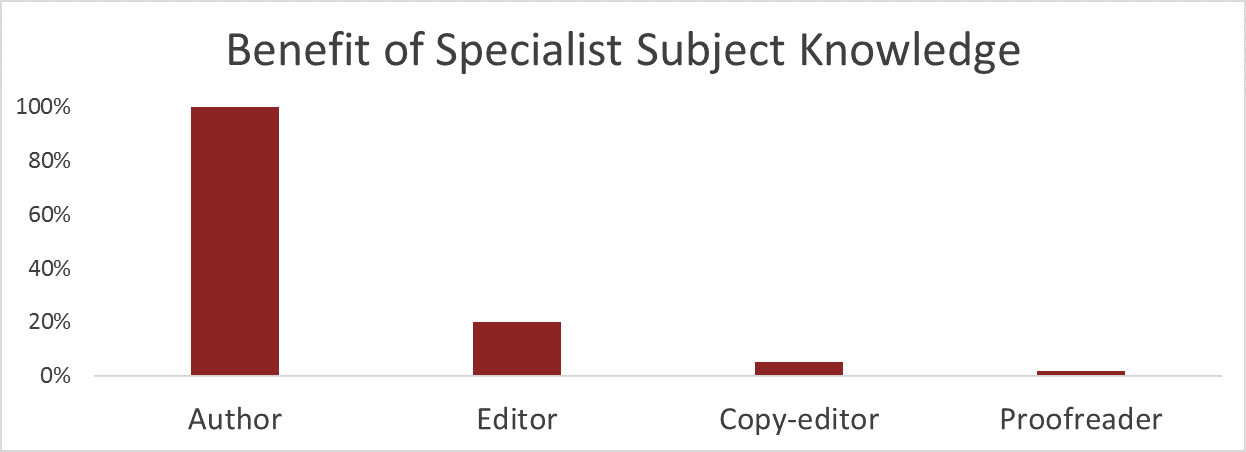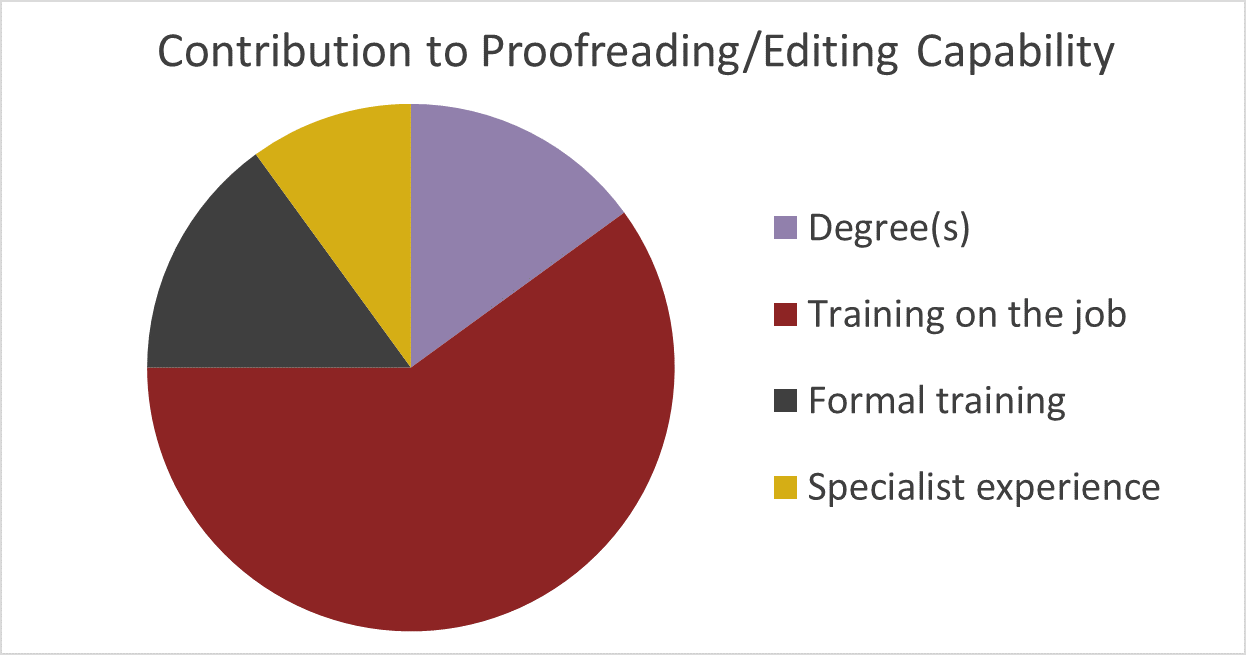|
Part of my mission with this blog is to help new entrants to the field understand the challenges and benefits of editorial freelancing, and to assist them as they navigate the early stages of their careers. There's no one way to build a business and one's background and preferences will influence the path taken. That's why, from time to time, I like to feature colleagues, particularly those who have a different skill set or career background to mine.
With this in mind, I'm delighted to welcome technical editor Peter Haigh to the Parlour. Peter discusses how he took a strategic approach to developing his editorial business, using his career specialism as a springboard ...
Hello. For those who don’t know me, I’m Peter Haigh and I used to be an electrical power systems engineer. Since November 2015 though, I’ve been a freelance copy-editor and proofreader.
This article is a little bit of a retrospective of how I went from being an engineer to being a proofreader and copy-editor and how I used my specialism to help with this. First, a little background and then I’d like to explore a few truths and myths about 'specialist proofreading' and share my experiences of getting started and then beginning to mature in the world of freelance proofreading/copy-editing. Why the move into proofreading and copy-editing? So, there I was, happily playing with spreadsheets and algorithms (specifying harmonic filter requirements for offshore windfarms) and one day I thought, 'I know, I want to be a proofreader.' Really? No, not really. Then why? It was all part of a deliberate plan to adopt a location-independent lifestyle. I work from apartments near beaches, forests and cities around the world and when I get bored I (along with my companion, Kate of kateproof) simply move somewhere else. That, coupled with the joys of setting my own work hours and leaving corporate quirks behind, was more than enough reason for a complete change of direction. Further details available here. What did I do to get started? Well, I kind of cheated. Having a wife that is now seven years into her freelance career – her empire is now established: an Advanced Professional Member of the SfEP with plenty of queries coming in – was a massive help. The Proofreader's Parlour (thanks, Louise) was also a mine of helpful resources and advice on a breadth of topics, marketing in particular. I did some basic online training and read some books and did their exercises, but I also benefited greatly from having a live-in mentor and trainer. How did it all evolve? The basic flow was: launch a website, do some training, practise on badly written work, build a web presence, do more marketing, develop confidence in my skills, win some good clients, keep them and then look for more! I confess: I still get about 50% of my work in the form of referrals from my wife. The other 50% comes from my website or from an agency that I signed up with last year. How did I market myself as a specialist proofreader/copy-editor? The first steps were made before I left my engineering job. I gathered together all of the business cards I’d collected throughout my career and I connected to as many people as I could on LinkedIn. I told my colleagues about my plans. I hoped that it might lead to work. So far it has led to copy-editing a colleague’s PhD thesis and I continue to edit for a CIGRE working group on a pro bono basis. Maybe one day it’ll pay off, most likely via word of mouth: I left on good terms. How did the client base evolve? To begin with, I sought out power system engineers and power engineering consultancies to scout for work. From this approach, I got one repeat client but on mates’ rates so it paid quite badly. Then, I spanned out via LinkedIn to say hello to various consultancies from all sorts of fields: environmental management, mechanical engineering, pretty much anything where I could connect with someone at a suitable level and very briefly introduce myself and my services. I think it was this that led to me winning what is still one of my best clients: an engineering consultancy, though nothing to do with windfarms or electricity. Another great client I found this way is a financial algorithm developer. How much does the specialism help me? This is something I ask myself sometimes, particularly when clients contact me specifically because of my specialism. With the advantage of hindsight, I sit on the fence a little and say, 'it depends'. When getting started When I set out, I was confident that I could find work in my specialist niche. I guess I did find a little bit of work, but then it’s a highly specialized niche and so naturally the opportunities are limited. I also discovered that large companies have well-defined processes for recruiting freelancers and tend to prefer dealing with large agencies or subcontractors. I remember battling with procurement restrictions from my days of engineering: it doesn’t matter if you are the best proofreader in the world, or how cheap you might be; if you’re not Achilles-registered then you will struggle to work for a utility. (And you don’t even want to know how hard – and expensive – it is to get registered.) To sum it up, I’d say that it helped a little bit. It gave me focus for my marketing, somewhere to start, and in an area where I had a clue about what made the clients tick and what the fancy technical words meant. It felt like I had a USP. Nowadays These days I have ditched my low-paying client from within my niche and continue to look for clients from a far broader range of fields. Most importantly, I have redefined what I think my specialism is. I am no longer a specialist in proofreading/copy-editing power system engineering documents. I’m not even an engineering specialist. I am someone who specializes in improving technical, numerical and scientific documents. Does my specialism help the client? My honest answer: my specialist power systems knowledge does not help them at all. However, at the more general level of being comfortable working with equations, tables, graphs, variables, and other forms of scientific text, I would say that this helps with a wide range of clients. From financial algorithms to social science surveys, knowing your natural log from your base 10 and spotting an unbalanced equation can earn some brownie points at times but, the thing is, that really isn’t proofreading as I know it. I’d say that as you move up the scale towards developmental editing, it becomes more important that you have some appreciation of the subject being worked on. For proofreading it doesn’t help much at all. In fact, here’s a geeky graph to illustrate this:
*Note: I made the numbers up.
Do qualifications and experience help? I think that at any stage in a career, it is possible to rest on one’s laurels. When starting out, they may be the only support available, so I’d recommend using them as a springboard, along with any specialisms, and growing from there. I certainly set out to build on my specialist experience at first, then sought ways to hone my skills, grow capability and branch out into new fields of experience. Hang on, I can feel a pie chart coming on!
Let’s take a look at each slice of pie.
Degree qualifications I am yet to work on anything related to my philosophy degree (past life) – other than a blog article on the philosophy of proofreading – but it did expose me to lots of books, and I wrote lots of academic essays, dissertations etc. I’d say this helped me a little bit. My engineering degrees exposed me to lots of technical documents, maths and other science stuff, as well as helping my confidence when setting up as a proofreader/editor by giving me a USP. Specialist experience My work experience as an engineer helped expose me to writing, editing and reading lots of technical academic journal papers. This is now something that I edit a lot of, and feel that I am good at, so I guess that helped quite a bit. Formal training I did a basic grammar course (Gpuss), read Barbara Horn’s Copy-editing book and did the exercises and also had access to Kate’s PTC course notes. All of this helped me quite a bit, but was not as helpful as seeing some of Kate’s work (with her clients’ permission, of course) and asking her 'why?' all the time, not to mention Kate checking my first few projects before they were returned to clients. Training on the job My editing and proofreading experience is 60% of the pie for me. Learning on the job was what helped me most and, to begin with, it was a case of working for mates’ rates to get experience. It also helped me to start off by working on, dare I say, badly written documents. The end product would be unrecognizably better, even if some of the finer points were not 100%. Then I kept looking for ways to learn and improve. Editing for an agency helped because, particularly when I first started, their quality control editors reviewed and critiqued my work. This was great because they showed me where I had missed something and made helpful suggestions. They also gave me positive feedback when the quality controllers were happy and now don’t seem to check my work much at all. Summary Hopefully I have given a bit of an insight into what it was like for me transitioning from an engineering specialist to a proofreader/copy-editor and how my specialism has helped me to make that transition. I’ll attempt to leave with some wisdom from my experiences of making the transition:
Peter Haigh is a professional proofreader and copy-editor and a Chartered Engineer. He specializes in improving technical, scientific and numerical documents.
Visit his business website at Technical Editorial or connect on LinkedIn or Facebook.
0 Comments
Leave a Reply. |
BLOG ALERTSIf you'd like me to email you when a new blog post is available, sign up for blog alerts!
TESTIMONIALSDare Rogers'Louise uses her expertise to hone a story until it's razor sharp, while still allowing the author’s voice to remain dominant.'Jeff Carson'I wholeheartedly recommend her services ... Just don’t hire her when I need her.'J B Turner'Sincere thanks for a beautiful and elegant piece of work. First class.'Ayshe Gemedzhy'What makes her stand out and shine is her ability to immerse herself in your story.'Salt Publishing'A million thanks – your mark-up is perfect, as always.'CATEGORIES
All
ARCHIVES
July 2024
|
|
|
|

















 RSS Feed
RSS Feed





